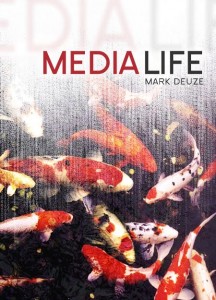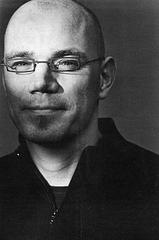Book Review: Media Life by Mark Deuze
“media are to us as water is to fish.”
 By Seah KIM and Mihaela Naftanaila
By Seah KIM and Mihaela Naftanaila
This is the way Mark Deuze starts his new book Media Life, which he presented last Thursday evening at the CREA center. In his book, the author underlines the fact that we are so deep immersed in the media up to a point that we do not even recognize when we use them. The author is questioning and exploring a possible way to understand ourselves and our world in relation to media, which have become “ubiquitous”, “pervasive” and almost “encoded” in our genes. “Whether we like it or not, every aspect of our life takes place in media”. This is one of the main ideas that Mark Deuze emphasizes in this book.
His works are grounded upon the rich theoretical backgrounds regarding the relation between media and society. In his previous book Media Work, he sees our capitalist society powerfully fragmentized and atomized, while in his recent work, Media Life, he is more optimistic towards the media environment. According to him, we had better stop emphasizing only the impacts of media technology, but rather reflect upon our media environment. Furthermore, he states that we live in a world where we have both an individual and a collective control of reality. In this context, our society governed by media has become “like every single website permanently under construction”. In this new world, we do not give up freedom, but freedom should be understood in relation to media that affect our personality. Through new media we all have become artists of our lives and this evolution gives us the privilege to use media to make art of life.
Let us go over the key points of his new book. In the first part of the book, the author underlines that we live “in media”, not “with media” and that is why we should carefully examine the changes in the social arrangements related to the current media environment. Thus, he analyses our everyday practices and everyday life. In the latter part, he explores the idea of responsibility in relation to media. Everybody is a storyteller, everybody is a journalist or game developer. However, what is important is how we participate in the storytelling and who we want to be and what we want to do with media. “We can indeed create art with life”, is the idea that he emphasizes.
One of the most interesting parts of the book is the fifth chapter where he introduces the idea of the “Zombie apocalypse”. He stresses that like zombies we lose our individuality and get collectively lost in technologies, where the boundary between private and public becomes blurred. “Like zombies we cannot seem to get enough of media”. The conclusion of this chapter seems to be that “media mediates more than ever before” and that reality in media is “an open source”.
In conclusion, Media Life is a good opportunity for New Media MA students to explore incertitudes in the field, to validate some of their questions, to rethink the influence that technology has on people. The book is impressive in terms of its strong theoretical background for dealing with such a contemporary issue, from so different fields, such as philosophy, psychiatry, media and cultural studies, sociology. Thanks to this deep and rich theoretical background, he successfully situated his own view in relation to all these fields. All in all, the author has a unique insight into media life and that is why this book is more than worth studying.
A fresh and inspiring book, dense in original ideas and intuitions. It is an outstanding book to read, to study, to cite, to have on the shelves of your library, to lend to friends, to suggest to students and to think about when you yourselves take part in media life
Leopoldina Fortunati, University of Udine
For those of you who are interested also in the author’s perspective, we did a short email interview with him.
1. The theme of “media in everyday life,” not “media with everyday life” is consistently emphasized in your works. In Media Work, you were more focused on people who actually work in media (“professionally” produce media). But in the recent book, Media Life, you stretched your argument to a broader range. Can you briefly tell us how you developed your idea from Media Work to Media Life?
In a way, the study of media workers was premised on the assumption that they would be ‘better’ at living in media, given their professional skills and proclivities. in other words: we can all learn from the pros.
2. Why did you use concepts from the previous book, such as avatar or liquid modernity or cultivation of identities? Why are these concepts so important to understand media life?
To link conceptualizations about social reality (coming from social theory, contemporary philosophy, and sociology) with media studies is an ontological move similar to the praxeological one to link the mundane of everyday life with our daily use of media. It broadens as well as fuses our horizons.
3. You proposed a new theoretical perspective on studying everyday life in media, “the media life perspective.” With that perspective, we can understand creative agency of media better. What should we take into consideration when applying that perspective to our own research?
My best answer is posted on my weblog.
4. In one of your chapters, you emphasized the concept of Media Zombie. What kind of future do you foresee from this perspective?
A future where we will learn to think beyond categories (man/woman, rich/poor, north/south, christian/muslim and so on); A future without necessary hierarchies/leaders; A future where we will be passionately engaged without necessary trying to impose a particular future or way of life onto each other.
5. Can you give any advice to graduate students studying new media and digital culture?
Try to look beyond media.
About the author:
Mark Deuze is an associate professor at Indiana University, Department of Telecommunications. He wrote several books in the media field, such as Media Work (Polity Press, 2007), Managing Media Work (Sage, 2011) and many academic papers. You can find him on the blogosphere or on Twitter.
